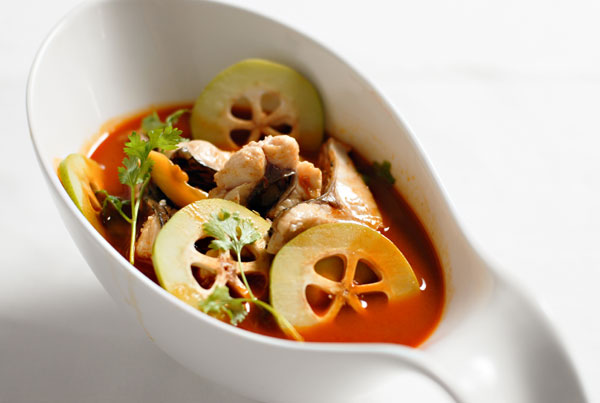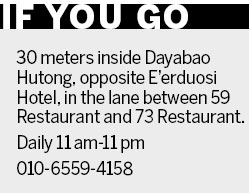

|
 The papaya, steeped in tomato and citronella, pairs nicely with the fish. Provided to China Daily |
Beijing
If the restaurant owner had not explained the location, it would have been difficult to find Wu Chan Ju, or Easy Restaurant. It is at the end of a narrow lane on the eastern side of Jinbao Jie near Wangfujing, with a traditional Chinese wooden doorway, exactly like its neighbors in the hutong.
But once inside, you'll find 67 Dayabao Hutong a secluded refuge.
One is soothed by the serenity of the small courtyard house with its three rooms, especially because it is so much at the center of Beijing, next to one of its richest commercial malls.
The restaurant has two cozy private rooms, and a minimally decorated public dining area with a few traditional Chinese tables for four, and a rather small outdoor space.
Owner Zhang Zhi is a young man who said he had "retired" from the IT industry, and now devotes all his time to this small eatery opened four months ago. Initially his intention was just to build up a place with safe, tasty food for himself.
Zhang says most of his clients are from 30 to 50 years old. Customers in their 20s just don't come back. The reason, Zhang feels, is "they are probably frightened by the quietness". But older people seem to like to return.
Zhang offers Yunnan cuisine, and his chef is a young ethnic Yi people from that province. There is no menu. You tell him how much money you want to spend, and Zhang will arrange a meal for you.
The cheapest meal costs 128 yuan ($20) per head, and the most expensive 1,000 yuan a person. He says the average bill is about 180 yuan. Zhang says the more expensive options use wild mushrooms from Yunnan, which can up the costs considerably.
One instant winner is a beautiful bowl of red soup made from grass carp and green papaya from Yunnan. The papaya, seasoned with tomato and citronella, works really well with the fish, and makes the soup mouthwateringly sour, and tenderizes the fish in the process.
The dish is included in the 200 yuan a person meal.

"Tree flower" is a brownish looking lichen from Yunnan, and looks and tastes like seaweed. It is served along with marinated spicy duck giblet. Fresh boletus mushroom is crisp and sweet and fried with a tender tasting green pepper from Yunnan. The pepper is only slightly peppery.
For dessert, there is Dali Yunnan cheese with rose jam, and rice cake with black sugar.
The restaurant makes two white liquors with Beijing's strong erguotou, one with black truffle, and another with Yunnan green plums. But the house rice wine, steeped with honey and rose, is a must-try.
Wu Chan Ju literally means "zen free". Owner Zhang says he wants the food here to be simple and unsophisticated. In actual fact, although the presentation is simple, the dishes are tasty and diverse with a good representation of Yunnan cuisine.
You can contact the writer at yejun@chinadaily.com.cn.